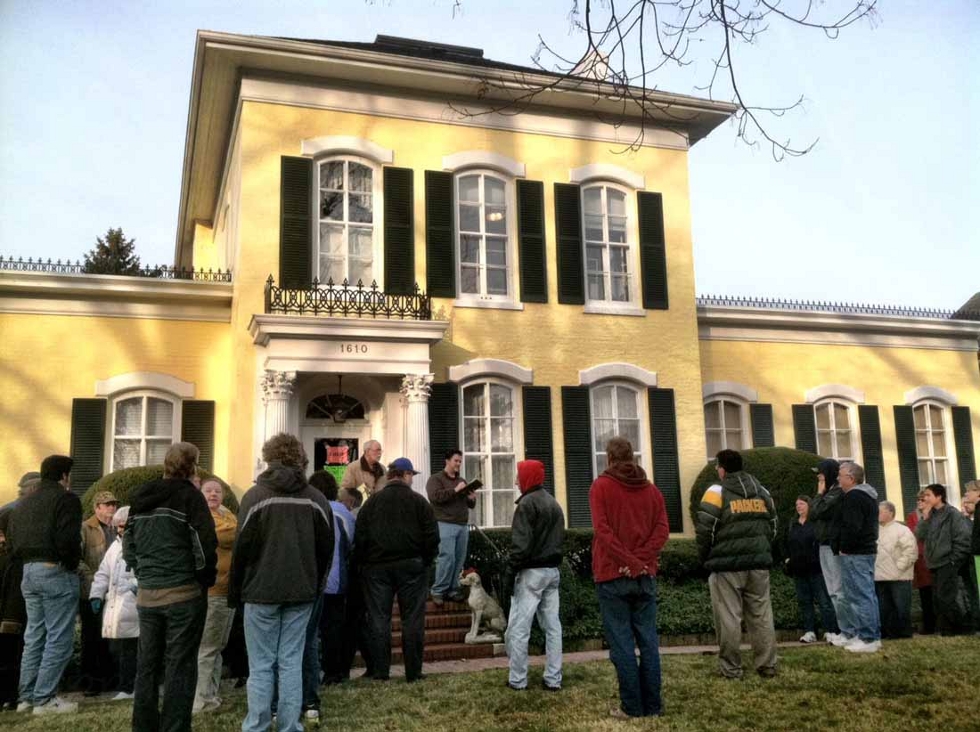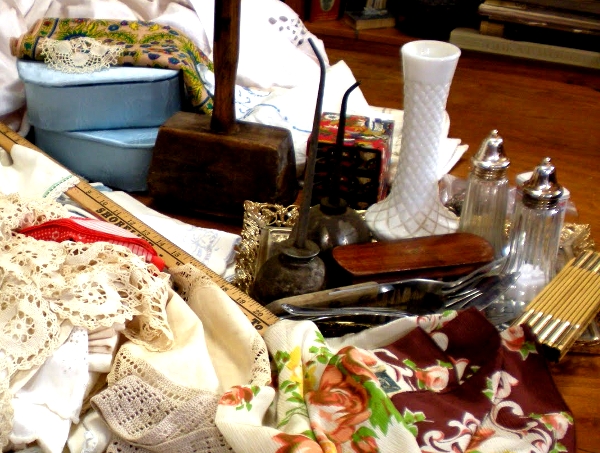estate sale
by Sarah McFarland Taylor

I am not someone who likes to shop. In the past, when a girlfriend has invited me out to a Saturday shopping spree as a “fun” recreational activity, I have let it be known that I would find ritual seppuku a more attractive alternative to spending the day in and out of crowded stores. However, when my family and I recently moved out of the city and bought a 1920s home in small lakeside village, none of our modern stuff looked right in it. For both environmental and economic reasons, I decided to explore the world of estate sales and the realm of “pre-owned” everything. I expected of course to find a lot of old junk, but I did not expect the intimacy with which I would sift through peoples’ lives, nor did I predict the kind of stories my fellow tribe of estate sale hunters and I would share related to powerful assemblies of personal objects.
What hidden treasures or promising insights lurk in the mundane spaces where we don’t expect to find spirituality and religion—in the dark drawers we stumble upon where we might otherwise never think to look? How do objects, too often dismissed as “secular” and thus irrelevant to our research, possess a kind of spiritual power in people’s lives that offers us qualitatively different insights into the worlds they make and occupy? With essays on everything from espresso to cell phones, Frequencies addresses precisely these questions, but to colleagues who do not embrace this kind of approach, it may well seem a bit, well… eccentric. As I began to comb through the drawers and closets of strangers’ homes, their bathrooms and basements, sideboards and sun porches, I was taken into worlds of eccentricity, and became fascinated by what, through either downsizing or death, was left behind, especially the attentive care to various collections. What objects held some sort of compelling power in people’s lives to the point of inspiring devotional practice, if only for a time?

Since beginning my journey through the world of the “pre-owned,” I have poured over table after table of Lladro figurines, decorative spoons from destinations all over the world, assortments of “museum-quality” commemorative plates, and jumbo-sized plastic Container Store crates of Beanie Babies. Then there are the linens—the mountains beyond mountains of linens. This is how I met “Wendy,” who collects hand-embroidered linens from American estate sales and then sells them on the internet to her customers, mostly in China. “You’re sending linens to China?” I ask. “Isn’t that like coals to Newcastle? Aren’t most of them made there?” She explains that Chinese ladies want fine Irish linens with the real lace and hand-embroidery—the kind that would be handed down in American families. A tablecloth she picks up at estate sale for $2, for instance, she can turn around and sell for $25. “Americans don’t want them because you have to iron the darn things, and who has the time?” She tells me that there’s also a good resale market in Asia for more sentimental and hokey embroidered linens (a little girl with an umbrella, sun flowers, kittens, etc.). “Here, we think those things are kind of cheesy and in bad taste, but in Asia they are just crazy for the little girl sitting on the polka-dotted mushroom, or teddy bears having a tea party. And, oh my God, the shamrocks! They love anything with embroidered shamrocks. It adds value.” While contemplating shamrock-embroidered linens with soy sauce stains, I ask about dry cleaning instead of hand-ironing and why that might not be an option. “Well, it is except that it’s expensive and we don’t use nice tablecloths anymore anyway. Most people get them out once a year but have even switched that to nylon or polyester. In Asia they will hand wash and iron them, or at least the person working in their house will do it for them.” I ask if she resells any of the linens within the U.S. or if it’s all mail order to Asia. Wendy says almost none of her linens go to buyers here and declares America to be pretty much a post-linen tablecloth nation, adding “We just don’t have big formal events anymore, so they pile up and sit in the closet.”

In the wee hours of the morning, I have arrived three hours early at the door of a well-to-do woman in her late 90s who has recently passed away. It is a beautiful old home on a quiet hydrangea-lined lane of gracious Tudors and Georgians. I immediately make sure to get my name on “the list.” Turns out, I’m a latecomer. The hard-core hunters arrive at one and two in the morning at a promising sale site and start “the list.” They then sleep in their cars outside the house. When newcomers arrive, they must knock on car windows to find out who is guarding “the list.” The lore is that down in Chicago, anyone trying to “jump the list” gets shot by one of the dealers. Up here in the suburbs, you just get yelled at and shunned. No one ever lets you on the list ever again.
When the sale begins, entry numbers are given in order of who is on the list. Arriving only three hours in advance, I am number 27, but this still leaves a lot of waiting-around time to talk. Other hunters will ask you casually what you are looking for, and some of this chit-chat is “fishing” to see what kind of competition you are and whether they’ll have to hustle to beat you to an item. I have “newbie” written all over me, but I know enough to shrug and vaguely comment, “Oh, this and that . . . nothing in particular.” (In reality, I am b-lining for a 6×9 oriental rug that I suspect has been way under-valued.) I in turn ask the preppy blonde mom to my left what she is looking for. “Well, you can tell from the online photos that this lady just loved yellow, so that’s basically why I’m here. I think that shows, you know, a positive attitude—to fill your house with yellow. So, I knew her stuff would feel good in my house.” I end up buying two 1920s yellow formal living room chairs and an entire 1950s white wrought-iron sun porch dining set with six yellow cushions.

On my various estate sale hunts, I routinely come across family Bibles, Books of Common Prayer, marriage licenses, old birth certificates, confirmation certificates, and First Holy Communion certificates with related memorabilia—all for sale. This surprised me at first because these seemed like intimate heirloom items that even retirees or the deceased’s family members would retain. But, in fact, these items appear fairly incidental and unremarkable in the topography of the seller’s home when compared to other carefully tended collections. In one home I sifted through, I found a few styles of Seder plates and menorahs in the dining room, mingled together in boxes with other holiday effects. I then turned the corner into the husband’s study and found it covered wall-to-wall in chest-high pillars of meticulously stacked Playboy magazines. It was like walking through one of those corn mazes we have here in the Midwest; this was a bumper crop of T&A as far as the eye could see. I marveled at the time and dedication it must have taken to amass this collection over the decades—the sheer devotion it took to obtain and retain each and every month of each and every year and to maintain it all in chronological order. The estate sale ad had said “downsizing sale,” so I knew that the seller was not deceased. I asked the estate sale monitor who was dutifully guarding the carefully curated playmates how someone could possibly part with something that had clearly been a decades-long devotion, involving so much of his life. He laughed and said, “He was really broken up about it. They’re moving down to Florida and the wife said that ‘the girls’ just couldn’t come. No room! But I think he rescued some favorites. I’ve been finding some gaps here and there, and this is not a guy who would be okay with gaps.” He then held up one of the covers and mimicked the playmate’s pouty-lipped face to express sympathy with the poor guy who had to leave “his girls” in order to follow his wife obediently down to a life of gray-haired retirement.
A few months into my estate sale crawl, I discovered that when sales are advertised as being a “real dig” or even “a bit of a dig,” this is code that the seller has been a something of a pathological collector along the lines of cartoonist R. Crumb. The old term for this was “pathological hoarding,” but the new and supposedly less pejorative term is “obsessive-compulsive collecting disorder.” The proposed description and diagnosis for this disorder in the upcoming fifth revised edition of the Diagnostic and Statistical Manual of Mental Disorders (DSM-5) offers the following description: “Persistent difficulty discarding or parting with possessions, regardless of the value others may attribute to these possessions. This difficulty is due to strong urges to save items and/or distress associated with discarding. The symptoms result in the accumulation of a large number of possessions that fill up and clutter active living areas of the home or workplace to the extent that their intended use is no longer possible. If all living areas are uncluttered, it is only because of the interventions of third parties (e.g., family members, cleaners, authorities). The symptoms cause clinically significant distress or impairment in social, occupational, or other important areas of functioning (including maintaining a safe environment for self and others).” I will confess that when it turned out that two of the three estate sale “digs” I first encountered happened to be the homes of retired college professors (seriously), I became a bit more self-conscious about my own home and office. On the other hand, that’s what we do—dig, sift, and collect; dig, sift, and collect. It is much neater and cleaner to focus on the self-evident realm of the religious—the family Bibles, the confirmation certificates, the menorahs, and the statues of Mary with the baby Jesus. I can compartmentalize and organize those things more readily. I know where to put them.

But what about the carefully kept shrines of tittie magazines and the holy sepulchres of Hummels? Where do I put them and the stories of their devotees? And what of the passing away of shrines over time, as with one woman’s reliquary of 165 pairs of fancy gloves, or closets stacked high with dusty embroidered linens—a vestige of holidays once celebrated in a way that no longer makes sense to most Americans. What was sacred once is no longer as lives shift and change and objects get discarded altogether, or they change hands and take on new meanings in new homes. Cast-off shamrocks that have lost their power in the U.S. take on a new life and become coveted symbolic treasures in their migration to Beijing tables. If, as Ray Browne has argued, popular culture studies are the “new humanities,” then what can cast-offs and collections tell us about American spiritualities and the religious dimensions of an ever-changing consumer culture?
I got a call late one Sunday night from an estate sale company letting me know that an antique library table I had put a low bid on never sold over the weekend, so my bid had won the item. I needed to pick it up immediately, as the house would be turned over to the new owners the following day. I arrived and picked up my prize table from the living room, and when I did, it left a dramatic pattern of the much-darker, much-older, presumably original floor finish it had been concealing beneath it. I was speculating on just how long this table had been sitting in the 90-plus-year-old woman’s home, when I realized that it rattled. Annoyed, I wondered what I had not seen in my initial inspection and worried about the drawer being broken. I brought the table home and when I took out the top drawer, I discovered the source of the rattle. At the very back of the drawer was what looked like a beautiful small hand-painted porcelain lady’s pillbox. When I opened it up, it turned out to be a small fancy matchbox instead. I tapped the antique gold-tipped matches into the palm of my hand and saw that there was a bit of folded paper lining the box. I opened it and read two words written on the slip of paper: “Yes. Promise.” In my romantic musings, I wondered if the box’s owner handed the little box to a suitor at a party to pass on this secret affirmative message (as in, “Yes. I’ll meet you. Promise.” Or, “Yes, I’ll marry you. Promise.”) or, perhaps this had been an issued mandate (“Yes. Take me away from all of this. Promise.”)
How many of us have shared the topics of our current research projects and heard the response, “But I thought you studied religion”? Scholars of religion must, and understandably so, appear at times to be compulsive collectors without rhyme or reason with our jumbled universe of sources creating a “bit of a dig.” Perhaps it is like being the R. Crumbs of Religious Studies. But, to paraphrase the DSM, “regardless of the value [the field] may attribute to these things,” and precisely because of the powerful meanings and stories people attach to them, these collections push our field to broaden, to move beyond the neatly-ordered Crate & Barrel versions that have conventionally defined our field to explore the recombinant culture of the estate sale. This kind of transgressive shift is always somewhat daunting. But it’s also exciting in the possibilities and yes, promise, it holds for reimaging what religion is, to naming it as the ultimate “remix culture.”